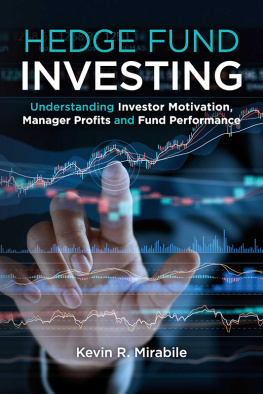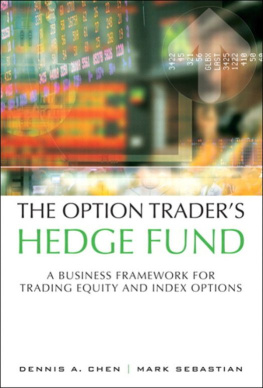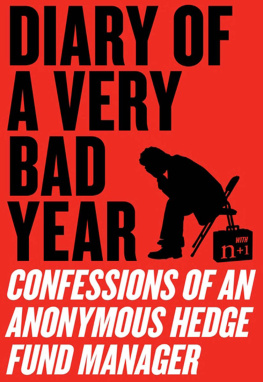All rights reserved.
Foreword
By Cliff Viner
Our firm, III Capital Management, is a unique place. In July 2017, well celebrate our 35th anniversary. Since our founding in 1982, weve witnessed a tremendous evolution in the fixed income arbitrage and derivatives business. While III is certainly a meritocracy, our partners and employees have created a legacy and culture of true collaborative effort. Our partners are paid from the same collective earnings pool, and our employees know that the better the organization performs as a whole, the more were able to increase our compensation across the board. Everyone is incentivized to pull in the same direction.
The collaborative effort is conducted in an atmosphere of respect, friendship, and, above all, character, character, character. And thats where Garth comes in. Garth has been with III for almost twenty years now, and he exemplifies the best of what III stands for. He began as an assistant trader but quickly proved his trading acumen, analytic abilities, and management and business development skills.
Early on, Garth dealt in US government and agency securities and US agency mortgages, hedging these various assets with Treasury futures contracts, interest rate swaps, and swaptions. He then expanded that scope to the Danish mortgage market, creating hedging techniques that did not exist prior to his entrance into that market.
Subsequent to those trading activities, Garth became a partner at III and exhibited his substantial business development capabilities by guiding III into the credit and credit derivatives business. He hired outstanding individuals of diverse credit talents, helped launch our two long/short credit vehicles, and was instrumental in creating our Credit Bias fund in 2007, which benefited greatly from its short credit exposure during the 2008 financial crisis.
Through both good times and difficult times, Garth has always shown the important personal and professional traits necessary for success. He was constantly pushing the companys collective scope of knowledge, allowing us to enter new markets, develop new expertise, and push the boundaries of fixed income and credit arbitrages.
His even - handed style and composure have been crucial to helping us maintain our particular culture. Even during 2008, a trying time for the fixed income derivatives business, we could count on Garth to deliver measured and well - thought - out assessments at our 7:00 a.m. partner strategy sessions.
Yes, Garth has seen and experienced it all in his years in the industry. His stories and personal reflections will certainly amuse and educate the reader. Ultimately, his instructions, advice, and admonitions ring true, because they come from the strength of his character. They are based on the most elevated meanings of personal success, achievement, and fulfillment. Sure, there are many paths to success. But ultimate satisfaction comes from reaching those goals and being proud of the road that got you there.
Garth has every reason to be proud of the road and direction of his career. Youll gain from his business teachings and the spirit and point of view that permeate the entire book. I wish the reader of this book much success, and I am grateful to have Garth Friesen as a partner on my own business journey.
Cliff Viner, Founder and CIO, III Capital Management
Introduction
Wall Street. People hear the words and their minds immediately race to familiar scenes from popular culture, like Gordon Gekko declaring, Greed is good, or the raucous parties in The Wolf of Wall Street . Maybe they bring to mind some of the damning articles or books written about the industry in recent years, like Sam Polks New York Times editorial depicting Wall Street as a den of avarice and addiction, or Michael Lewiss The Big Short , and his semi - autobiographical Liars Poker , which portrays Wall Street as a form of legalized gambling. The media, eager to find villains for the financial crisis of 2008 have reinforced these stereotypes by sensationalizing every instance of financial malfeasance.
Ask anyone to describe a typical Wall Street trader, and theyll throw out words like arrogance and excess . Theyll grumble about unwarranted bonuses going to people who got jobs because of nothing more than an Ivy League education, a well - connected father, and the old boys club. The assumption is that once these young traders land a position, they have made it. On top of the world, they sit back and bank millions of dollars for the rest of their careers while doing little work.
With a twenty - plus year career in finance, which saw me rise from a loan processor at a small foreign bank to the Co - CIO of a $4 billion hedge fund and a member of the New York Federal Reserves Investor Advisory Committee on Financial Markets, I can confirm that the reality is far different from the reputation.
Maybe twenty years ago trading floors were packed with tradersties loosened, collars open, shirt sleeves rolled upshouting out orders, cursing, slamming down phones, and verbally abusing new hires. Anyone walking onto a typical trading floor nowadays, however, would be surprised at how the atmosphere matches that of a university library. Trading is a cerebral process, and the sound of crunching keyboards is the only noise breaking the silence on the floor. If not for the four or five computer monitors on each desk, thered be no way of knowing it was an investment firm.
Trading may be a high - stakes , high - stress world, but at the end of the day, a trading floor is a professional environment. Most people who are hyper - aggressive and bully other traders on the desk, or live the party lifestyle, are eventually shown the door. A lot of people are fighting to get a seat at a trading desk, and if a trader doesnt perform exceptionally or behave appropriately that seat will quickly become available to someone else. Huge sums of money are at stake and firms are not interested in making accommodations.
Like in any profession, a few bad apples can produce a negative stereotype for anyone engaged in the same line of work. Yes, there are Ferrari - driving , fast - living individuals, but these arent representative of the majority of traders, and certainly not the profile of someone who lasts in the business. Trading requires 100 percent dedication. Contrary to what most people outside the industry believe, the responsibilities of the job dont end when the market closes. If a major geopolitical event happens on a Saturday, a trader cant afford to wait until Monday morning to think about its implications for the markets. On Sunday night, a diligent trader is checking to see how the overseas markets are opening, and the end of the workday on Friday means already digging into the voluminous amount of reading required to effectively prepare for the week ahead.
What Ive observed over the years is a business that is increasingly professional and less fraternal. The antics and male chauvinism going on at banks twenty years ago are no longer tolerated. This doesnt mean traders lack personality and trading floors are no - fun zones. The occasional practical joke still happens, but its more tasteful than distasteful, a sideshow instead of the main event. Firms today are more diverse, and the traders are more refined and sophisticated, partly because theyre under such intense scrutiny, but also because financial institutions have an interest in recruiting highly educated overachievers to stay competitive. Theres less of a need for the former college quarterback who can network but has little knowledge of the markets.









